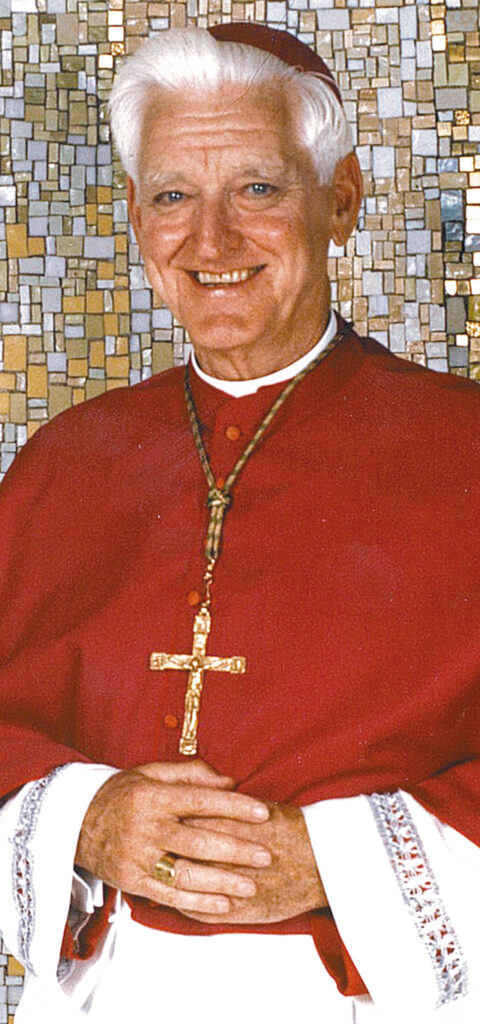
Twenty-first in a series on the 75th anniversary of the Diocese of Madison
Bishop Cletus F. O’Donnell accomplished much in over 25 years as Bishop of Madison.
Some of his accomplishments have already been discussed in previous articles, including the establishment of the diocesan Apostolate to the Handicapped, starting of the Office of Family Ministry, and efforts to promote vocations to the priesthood and Religious Life.
Catholic education
Meeting total education needs through Catholic schools and religious education programs was a priority for Bishop O’Donnell.
When he reflected on his 25th anniversary as a bishop in 1985, he thanked the many teachers, principals, and directors of religious education — both Religious and lay people — who staffed these programs in the diocese.
During his tenure, Bishop O’Donnell incorporated the offices of the Confraternity of Christian Doctrine (CCD), the Catholic Information Center on State St., and the Catholic Youth Organization (CYO) into the Religious Education Center housed at the former Holy Redeemer School in Madison, which had been closed for several years.
Bishop O’Donnell started a religious education consultants program, one of the first in the nation, which would reach all parishes and identify parish-specific programs.
Guidelines were issued for teaching junior high religious education.
Adult education was also encouraged as a priority in the diocese. Parish leaders attended workshops on the formation of small Bible study groups.
Serving the disabled
Besides the Apostolate to the Handicapped, the Diocese of Madison under Bishop O’Donnell’s leadership provided other areas of service to the disabled.
The diocese established a ministry with the deaf with Sr. Theresa Wolfe and a special religious education program headed by Ellen Cook, who served as president of the National Apostolate with Mentally Retarded Persons.
In addition, the diocese was the home of St. Coletta School in Jefferson, an internationally-known school for the mentally retarded of all ages. St. Coletta graduated its last students in 1990 but continues to provide support services to adults with developmental disabilities and other challenges.
Respecting all human life
Bishop O’Donnell strongly believed in the whole spectrum of respect for human life from the unborn to the sick, the old, and the poor.
“The whole concept of life has been cheapened,” Bishop O’Donnell said. “As Cardinal (Joseph) Bernardin has said, ‘life is like a seamless garment. If you tamper with any part of it, it can start to unravel.’”
The Diocese of Madison participated in the Campaign for Human Development, begun by the U.S. Catholic bishops in 1970.
One-fourth of the annual collection was given to local projects to attack the root causes of poverty and help low-income people.
Bishop O’Donnell praised the Society of St. Vincent de Paul in the diocese for its service to the poor and homeless.
He also cited the community meal programs offered at St. Paul’s University Catholic Center and St. Martin House in Madison as examples of the Church helping alleviate hunger. Bishop O’Donnell was encouraged that more and more individuals and families in parishes were caring for one another.
“It’s been a great consolation for me,” he said. “People are willing to help each other, and it flows from a deep love for Our Lord and His Church.”
Bishop O’Donnell spoke out against the U.S. Supreme Court Roe v. Wade decision issued in 1973 legalizing abortion. In 1974, on the first anniversary of the decision, he urged people of the diocese to counteract the “tragic ruling,” which he said had a “devastating effect on our country.”
Bishop O’Donnell attended many of the annual marches for life held at the state Capitol with prayer services following at nearby St. Raphael Cathedral.
His later years
Bishop O’Donnell, who had diabetes since 1974, suffered a stroke on September 13, 1990.
He was able to celebrate his golden jubilee of ordination to the priesthood in 1991. However, he suffered another stroke in the spring of 1992 and resigned as bishop in April of 1992.
He died on August 31, 1992. He was hailed as a spiritual leader and one of the most prominent bishops on the national scene.
He was one of only five incumbent bishops in the United States to have participated in all sessions of the Second Vatican Council.
During his time in the Dioese of Madison, the Catholic population grew from 180,640 in 1967 to 245,873 in 1992. However, the number of priests dropped from 280 (diocesan and Religious Order) to 183.
Sources: Building Our Future in Faith: Commemorative History of the Catholic Diocese of Madison (1996); archives of the Catholic Herald newspaper.
Mary C. Uhler served on the staff of the Catholic Herald-Diocese of Madison for almost 47 years, the last 34 years as editor. She retired in July of 2020.

